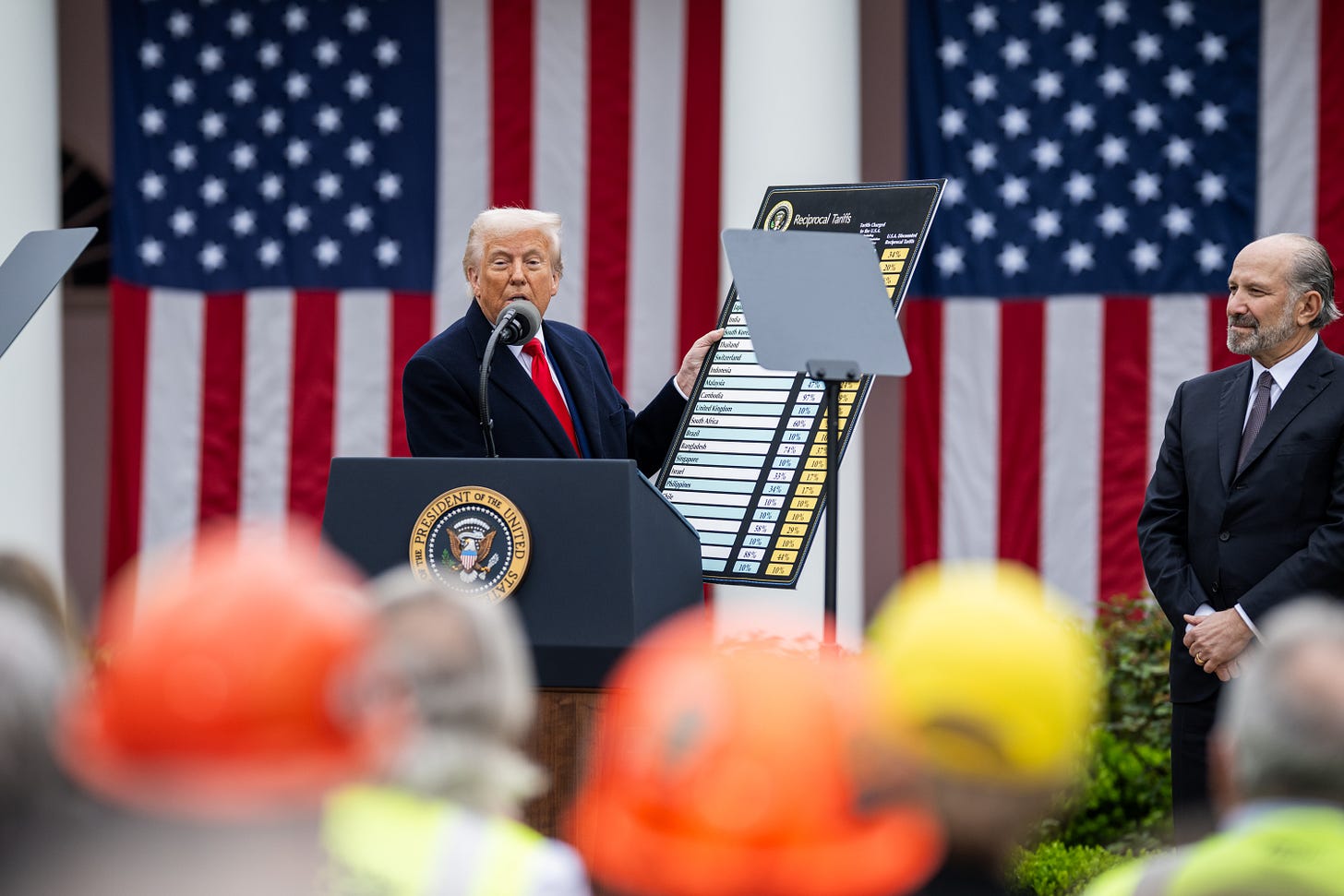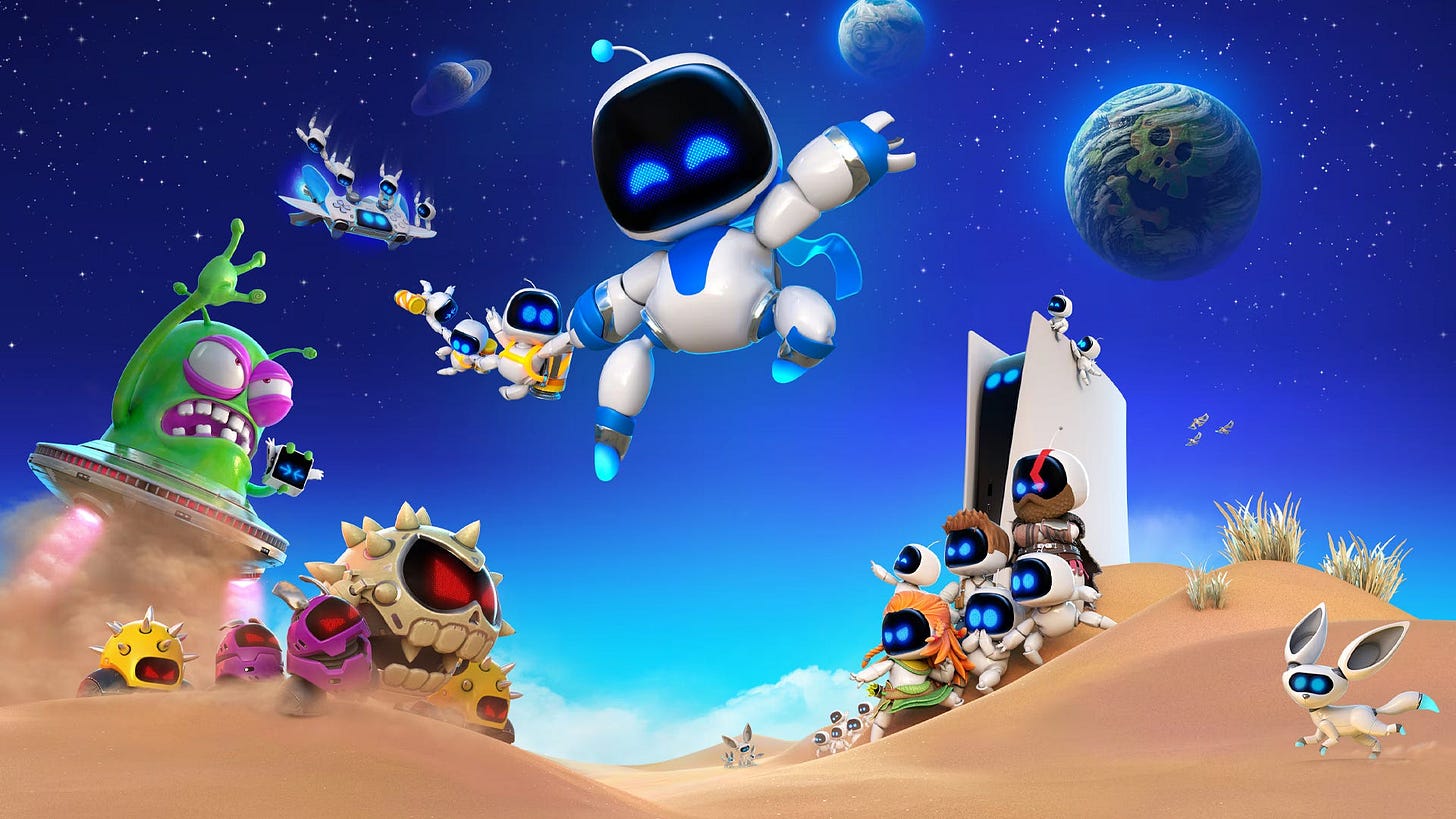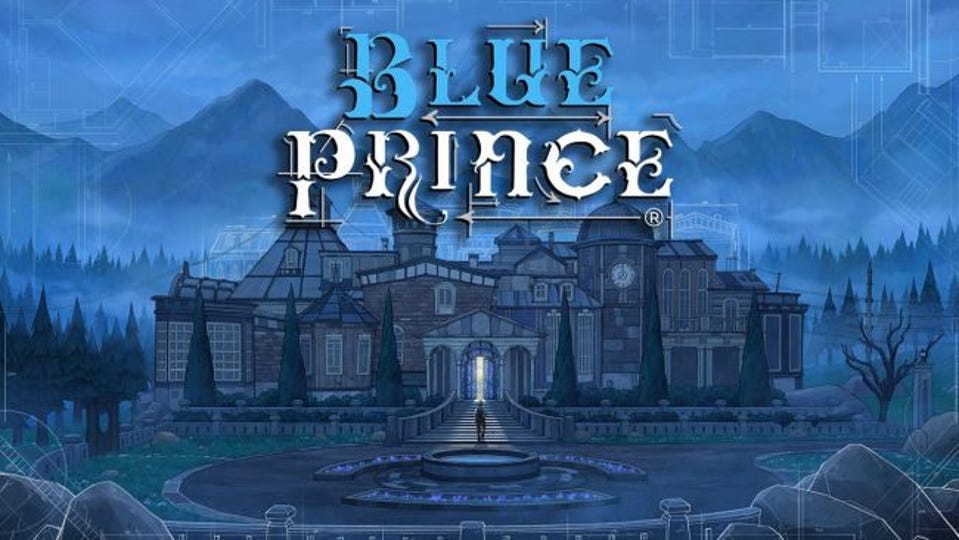Trump’s trade war hits video games, 10/04/2025
The games industry rocks (back and forth) as Trump's tariffs strike
Trump’s trade war causes mayhem for the global games business
Astro Bot wins big at this year’s BAFTA Game Awards
Blue Prince’s mysterious puzzling leads a week of fine independent releases
| Find me on Linkedin | Follow me on Bluesky | Wishlist my book | Email me |
Hello VGIM-ers,
I want to let you know about two things before I crack on with the rest of the newsletter.
First, the VGIM Business Breakfast is returning to Develop on Wednesday 10th July.
If you’d like to sponsor the breakfast before I open up for registrations at the start of May, email george@videogamesindustrymemo.com, and we’ll talk shop.
Second, Ask George is back tomorrow morning for paid VGIM Insiders. And in honour of the chaos that’s engulfed the financial markets in the past week, I’m running a Very Special Offer for one weekend only.
Use the code RECIPROCAL TARIFFS before Monday to get 34% off your VGIM subscription for the next twelve months. And unlike the stock market, I’m 99.99% confident that it will hold its value for the foreseeable future.
Oh and speaking of tariffs…
The big read - Trump’s trade war hits video games
White heat: “A week is a long time in politics.” You can say that again, former (and currently deceased) British Prime Minister Harold Wilson.
Quiet week: Since the last edition of the newsletter, President Donald Trump slapped punitive ‘reciprocal tariffs’ on trading partners across the world, sent financial markets into meltdown, and then pulled back from the brink by pausing the worst of his self-imposed import taxes yesterday evening.
Pre-cancelled: The video games industry had looked like an immediate victim of Trump’s Liberation Day tariffs. Nintendo announced it was delaying pre-orders of the Switch 2 in the United States (and Canada) as it considered the impact of tariffs on its business, while PC brands Razer and Framework both said that they were pausing sales of some of their devices in North America - provoking fears of a games market downturn (until, well, Trump changed his mind).
Unpicking the madness: So, what on Earth happened last week? Why were game hardware companies hit by Trump’s tariff regime in particular? What happens now that the tariffs have been reversed? And does this newsletter still make sense after THREE rewrites? Let’s find out.
Not too Tariff-ic
Back to basics: To kick things off, it’s worth briefly rattling off what a tariff is, why Trump loves them and what games businesses were planning to do about them before the Liberation Day announcement set fire to everything.
Dictionary corner: A tariff is a tax on imported goods or services imposed by one country onto another. Tariffs can be used by a government to raise money from anyone importing into the country. They can be used to protect domestic industries (e.g. by stopping cheap foreign goods from flooding a developing market) or to correct a trade imbalance. They can also be used to apply political pressure on another country, if it is considered to be in a government’s interest.
For whom the toll tolls: Importantly, Governments don’t pay tariffs; businesses do. This means that when a company pays a tariff, the cost of selling something goes up. Therefore, if they want to sell into the market they have to choose two options: suck up the cost themselves or pass it on partially or wholly to a consumer. Spoiler alert: they mostly do the latter.
Breaking with tradition: Since the end of the Second World War, countries across the world have tried to avoid using tariffs in favour of free (or at least freer) multi-lateral trade. Donald Trump, however, doesn’t think like that. He has loved tariffs for decades because he sees them as a brutish weapon: thwack another country with a tariff as hard as you can; and watch cash, companies and jobs flow back to US shores.
Trouble ahead: Unsurprisingly given his complete inability to handle any form of detail, economists disagree with Trump. Outside of his Mafia don world view, where the strong shake as much cash out of those they assume to be weak, the received wisdom around tariffs is that they are costly and economically regressive - making them bad for consumers, businesses and the economy at large.
Foresight: So, companies knew what was coming. They knew from Trump’s first term that he loves to slap tariffs on China. They knew from his 2024 election campaign that he was lining up to do it again. And just in case that wasn’t enough evidence for them, they also knew he was up for it because he tried to hit Canada and Mexico with tariffs only a couple of months into his second term in office.
Gaming the trade system: And yes, the games industry knew painful tariffs were incoming too. In November 2024, Gizmodo reported that a mooted 60% Trump tariff on China could push the cost of games consoles up by 40%. The Consumer Technology Association (CTA) forecast a similar increase earlier this year, estimating a 40-58% bump in the price of consoles and a 46%-68% increase in the cost of laptops.
Fox like: So, games hardware businesses came up with a series of cunning plans to try to outfox Trump’s tariffs before they arrived. Nintendo relocated parts of its console supply chain to Vietnam and Cambodia to try to skirt around import taxes that the administration was likely to levy on China. Laptop maker Framework revealed that it had pre-emptively bumped up the price of its laptops by 10% to anticipate an import tax being imposed on goods from Taiwan. There was even talk that mooted tariffs on Mexico could provide a handy excuse for games companies to end the sale of costly physical boxed games in North America.
Mayhem: But more than anything, games businesses did what everyone else in the market did. They hoped that Trump’s talk of imposing high tariffs would remain just that. And unfortunately for them, for the wider economy and us, they turned out to be wrong.
Complete madness
Find me a dunce hat: So, why did the video games industry’s careful planning get blown apart by Trump’s tariff agenda? It mostly comes down to a mismatch between what the industry expected to have to pay for tariffs and the frankly bonkers sums that the Trump administration came up with to calculate its global tariff regime.
Fishing for trouble: The first surprise in the Liberation Day announcement was the imposition of a 10% tariff on every country in the world aside from Russia (of course). As well as catching the entire world off guard, including the colony of penguins living on the Heard and McDonald Islands, the baseline rate immediately breached the lower expectations of Trump’s forecasted tariff regime - getting things off to a bad start.
Not very reciprocal: But it was the addition of a ‘reciprocal’ tariff rate on most countries that caused the problems we saw this week. The rate was pitched by the Trump administration as a careful calculation of how much a country had taken America’s largesse for granted through the international trading system.
Bad maths: However, James Surowiecki, a journalist and author, managed to reverse engineer the formula from the numbers listed on Trump’s board during his Liberation Day presentation. And it turned out that the formula for working out the tariff rates was remarkably banal. Simply take a country’s trade deficit with the United States, divide that number by its exports to the country and split it in two. Ta-da!
Utterly idiotic: The calculation was moronic for many reasons, many of which are best explained by The Financial Times. But the idiotic regime impacted the games business in two main ways.
Mean averages: First, the formula resulted in an eye-watering average tariff rate on any goods going into the US market. After accounting for tariffs of 20% in the EU, 25% in Japan and the bonkers rate of 50% in Lesotho, Dutch firm IMG estimated that the tariff rate on goods going into the United States was at risk of being as high as 26.5%, according to ING. This was ‘worse than the worst case scenario’ for tariffs according to Daniel Ives of Wedbush Securities - causing widespread wobbliness in the markets.
Unlucky losers: But second, and arguably more importantly for games companies, Trump’s tariff regime struck the sector’s main production bases hard.
Uh-oh: Taiwan was hit with a reciprocal tariff rate of 32%. China’s tariff rate was initially set at 34%, but was quickly bumped up by a further 50% after it dared to retaliate on the US with a similar sized rate. And most painfully for Nintendo, Vietnam and Cambodia were hit with reciprocal tariffs of 46% and 49% because both countries have big trade deficits with the US due to their role as manufacturing bases for a range of consumer goods.
Brief panic: This resulted in a panic across the games industry. While companies had planned for a tariff on their devices, they had not planned for such a significant increase or for tariffs to be levied on certain countries. This caused companies like Nintendo and Razer to pull back from their publicly announced release plans to work out what impact tariffs could have on their business.
Warning signs: And while the chaos raged, Aubrey Quinn, SVP of Comms at US trade association The Entertainment Software Association, warned in The Game Business that the new tariffs regime could have a painful “ripple effect” across the American games business: driving up costs for consumers and putting pressure on games businesses already struggling after years of challenges.
The gentleman is for U-turning
Volte face: But yesterday evening UK time, the situation swung dramatically once again. Trump announced that while he was raising tariffs on China to 125% (!), he was granting every other country in the world a 90-day pause on its reciprocal tariff rate - leaving most importers from around the world with the flat 10% tariff rate to pay instead.
The name’s Bond, Sold Bond: The reason for the change of heart appears simple; the markets were melting down. The S&P, the Nasdaq and the Dow Jones had, like all stock markets across the world, taken a battering pretty much every day since the Liberation Day announcement. But it appears as if a sell-off of US Government bonds, typically treated as a ‘safe haven’ for investors, forced Trump into a climbdown over tariffs that definitely isn’t a climbdown (at least according to anyone who wears or owns a MAGA hat).
Uncertainty ahead: So, is this reversal a win for games businesses? There are some positives, of course. The stock markets surged in response to the news that tariffs were being paused yesterday, something that should end the global financial chaos that has battered publicly traded businesses across the world. The refreshed 10% tariff rates on countries like Taiwan, Vietnam and Cambodia will likely resolve some of the concerns of certain PC and console hardware makers over the cost of their devices (and hopefully lead to those Switch 2 pre-orders opening soon). The news that Mexico and Canada have both been spared reciprocal tariffs should also improve the mood in North America.
Stop chicken counting: However, the imposition of a 125% tariff rate on China will remain a hefty burden on the US games industry given its importance in the manufacture of consoles, games PCs and smartphones that serve its player base. The 10% tariff global rate still means that prices will go up for both businesses and consumers in the US, even if they won’t increase as steeply as feared over the past seven days. And the 90-day pause on the imposition of reciprocal tariffs suggests that we should prepare ourselves for the possibility of another round of mayhem in July (especially given Trump’s volatility).
Breathe out: So yes, expect further trouble and disruption ahead. But for now, let’s all enjoy a deep breath in and a deep breath out. After the week Trump has put us through, we all deserve it.
News in brief
Astronomical success: Astrobot was the big winner from this week’s BAFTA Games Awards, picking up five gongs including the coveted Best Game Award. Other big winners from the night included Still Wakes the Deep, which won three awards, while Thank Goodness You’re Here! and Balatro won Best British Game and Best Debut Game respectively.
The k-IDs are alright: k-ID, the age assurance platform, has released its annual State of the Age report examining how age assurance is being managed for digital yoofs (our spelling, not theirs) across the world. There’s plenty in there to pick through, but the major headlines include a whopping drop in the number of games offering voice or text chat and the most commonly set legal age threshold for accessing chat features in online services around the world is now 18.
Not in moderation: Twitch CEO Dan Clancy has landed himself in hot water over his decision to unban Adin Ross from the platform. The streamer was banned from the service for allowing racist and anti-semitic comments on his channel. But despite going on to cosy up to Andrew Tate and host Nick Fuentes on his Twitch stream, Aftermath reports that Twitch’s CEO said the controversial streamer deserved a “second chance” on the platform. This surely wouldn’t be related to Ross’s closeness to Donald Trump, would it?!
Minecraft moolah: The Minecraft movie has generated $300m in its opening weekend, delivering the most successful opening for a video game movie of all time. The movie, which stars Jack Black and Jason Momoa, was derided by the critics ahead of its opening. But in news that will surprise no one, it turned out that 13-year-old boys don’t read broadsheets to decide what they do or don’t want to see. Shocking, I know.
Massive loser: Elon Musk has once again disgraced himself in the world of video games. The Wisconsin-election losing oligarch racked up another major “L” this week, after failing to beat a tutorial boss in the game Path of Exile 2 while livestreaming via a StarLink hook-up. Although VGIM doesn’t generally condone bullying, some targeted goading of people who think the law doesn’t apply to them is fine with us.
Moving on
Arthur Mostovoy has been hired as the first Head of Games at Swedish game group Aonic…Des Gayle is Unity’s new Senior Partner Relations Manager responsible for EMEA…Tamzin Taylor has jumped ship from Google to Apple to become Director of Developer Relations for the EMEA region…Sam Hilary is the new Senior Marketing Manager at nDreams…And in sad news, Bill Petras, the Art Director responsible for Overwatch and World of Warcraft at Blizzard has died unexpectedly. Our thoughts are with his family and friends…
Jobs ahoy
Epic Games is hiring a Creator Evangelist in Montreal…And in further ‘get a job in Canada’ news, Electronic Arts wants a brand new Senior Producer - EA Sports to get in the game in Vancouver…The Pokemon Company is hiring for a Marketing Manager in London who must be bilingual (Japanese, in particular)...Riot Games is looking for a Senior Manager, Game Production, Distributed Development in Sydney…And for those of you who fancy an effectively remunerated challenge, why not have a stab at the Communications Director post at Steer Studios…
Events and conferences
Game Dev Local, London - 12th April (£10 off with code VGIMGIFT)
Reboot Develop Blue, Dubrovnik - 14th-16th April
A.MAZE, Berlin - 14th-17th May
Digital Dragons, Krakow - 18th-20th May
Nordic Game, Malmo - 20th-23rd May
Games of the week
Blue Prince - Intriguing puzzle strategy game where you assemble your pathway through a mysterious manor launches today.
Monaco 2 - Sequel to popular multiplayer heist game throws players back into the unpredictable world of pursuing Monegasque riches.
The Talos Principle: Reawakened - Return to the remastered delights of the popular first-person puzzler on all platforms.
Before you go…
What happens when you get too into a simulation game? You get a job doing the thing you virtually love, of course.
Bertie Purchese at Eurogamer has written a lovely piece about the people who’ve turned their love for games like Euro Truck Simulator into a profession.







Regarding the final point: after 40+ years of playing games, they have failed to make me violent, but in recent years they induced me to powerwash patios 😁